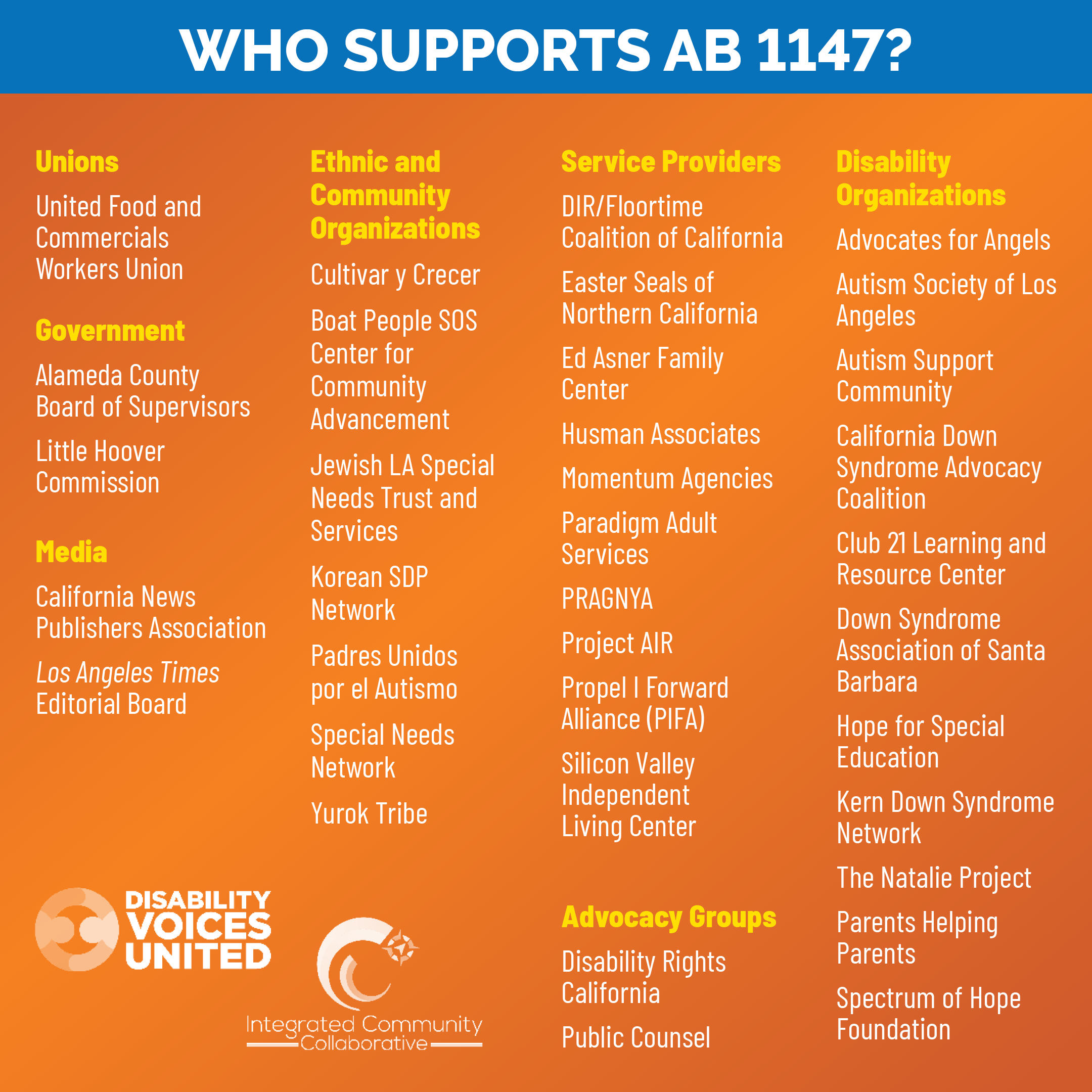Supported Decision-Making
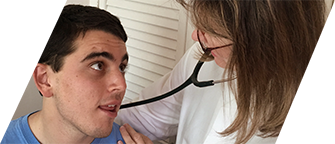
What is supported decision-making?
Supported decision-making (SDM) is what we do every day. We reach out to trusted experts – like a doctor, mechanic or even a mentor – to help us make decisions we may not understand. We are considered wise! Just like the rest of us, people with exceptional differences need assistance. One of the founding principles of SDM is that – just because we need support – doesn’t mean we don’t have interests, preferences, a full spectrum of choice-making abilities and the human right to express them.
SDM enables people with disabilities to choose supporters – such as trusted advisors, friends, family members, or professionals – to help them make choices to the maximum of their unique abilities. The supporters agree to help the person understand, consider, and communicate informed decisions. Individualized tools, services and accommodations are key to empowering the person to make these choices – especially for those with intellectual or developmental disabilities (I/DD) and who use Augmentative Alternative Communication (AAC).
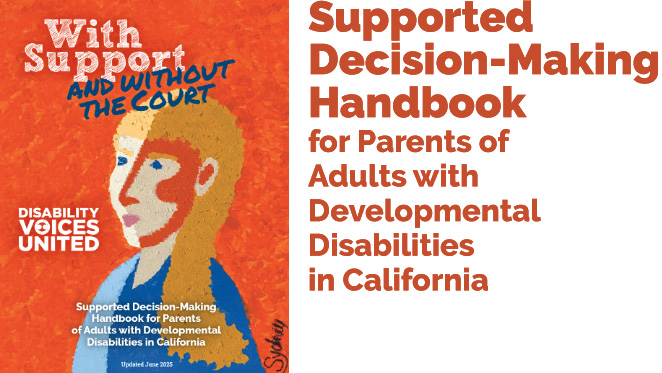
In 2020, DVU completed our Supported Decision Making Parent-to-Parent Training Project funded by the WITH Foundation. As part of this project, we created a supported decision-making handbook made especially for parents of people with developmental disabilities. DVU held 6 focus groups with parents as part of our project. This handbook, updated in 2025, contains information and material we selected to answer questions, concerns, and hopes we heard over and over again.
Our Handbook contains:
- Reasons to avoid conservatorship
- Reasons to use supported decision-making
- Examples to help illustrate how supported decision-making
- Specific advice for supporting people who are nonspeaking and/or use augmentative and alternative communication (AAC)
- Forms you can use to help support your adult child in different contexts, like at the doctor’s office or in an IEP meeting
- Resources for moving forward in supported decision-making
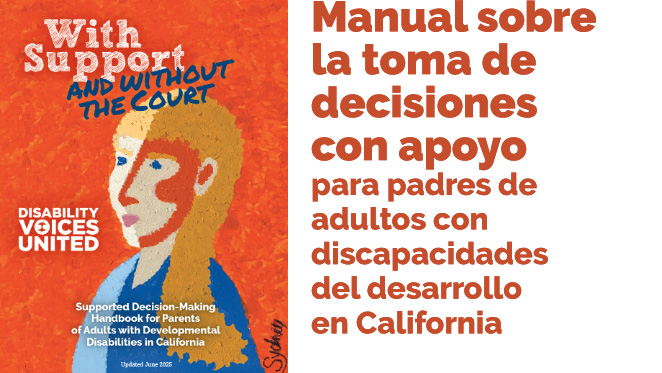
En 2020, DVU completó nuestro <<proyecto de formación de padres para la toma de decisiones con apoyo>>, financiado por la Fundación WITH. Como parte de este proyecto, creamos un manual de toma de decisiones con apoyo hecho especialmente para padres de personas con discapacidades del desarrollo. DVU organizó 6 grupos de discusión con padres como parte de nuestro proyecto. Este manual, actualizado en 2025, contiene información y material que seleccionamos para responder a las preguntas, preocupaciones y esperanzas que escuchamos una y otra vez.
Nuestro Manual contiene:
- Razones para evitar la curatela
- Razones para recurrir a la toma de decisiones con apoyo
- Ejemplos para ilustrar cómo tomar decisiones con apoyo
- Consejos específicos para apoyar a las personas que no hablan y/o utilizan comunicación aumentativa y alternativa (CAA)
- Formularios que puede utilizar para ayudar a su hijo adulto en diferentes contextos, como en la consulta del médico o en una reunión del IEP
- Recursos para avanzar en la toma de decisiones con apoyo
What does Supported Decision-Making look like?
SDM looks different for everyone. Here are some examples of customized tools to help people communicate and understand choices.
- Chosen, trained partners who listen and facilitate communication – using AAC if needed.
- Plain language, visual or audio material
- Extra time to discuss choices
- Lists of the pros and cons
- Role-play activities to help the person understand
- Supporters attending appointments to take notes and help discuss options
- Consideration of a joint bank account and other ways to manage financial decisions together
What are Supported Decision-Making Agreements (SDMAs)?
SDMAs identify the support the person wants and who will assist in each area. They are customizable according to the person’s needs. SDMAs are signed, notarized, and can be attached to legal, binding documents – such as an Individualized Education Program (IEP), a Durable Power of Attorney, a HIPAA form, or Social Security Representative Payee form. SDMAs can help a self-advocate practice SDM at school, in the healthcare setting and beyond.
SDM related goals with data and/or SDM language can be added to a legally binding document, like an IEP.
Is SDM in the law?
SDM is recognized in eleven states and in the District of Columbia. Both California and Massachusetts have proposed legislation under review that include SDM language and implementation. Currently, California requires that “alternatives are considered” prior to conservatorship, and SDM is one such alternative.
Here are forms in plain language that the American Civil Liberties Union (ACLU) and the Autistic Self Advocacy Network (ASAN) created. They can be used to help recognize a self-advocate’s choice to use supported decision-making at school, at the doctor’s office, and in the world.
How does DVU advocate for SDM?
Disability Voices United currently runs two projects.
The first is our Parent-to-Parent Supported Decision-Making Message and Training Development, funded by the generous support of the WITH Foundation.
This project conducts focus groups in both Spanish and English of parents of teenagers with intellectual and developmental disabilities (I/DD) in California. These focus groups test messages and materials which encourage SDM in health care and other areas. The focus groups will inform the development of training materials and presentations led by peer parents. Materials, train-the-trainer seminars, and an online training will be offered to parent-led organizations who have the trust of their communities and can leverage the project to a greater numbers of parents.
The second is our Supported Decision-Making California Advocacy Project (SDMCap. This project was funded with the generous support of Ability Central, the American Academy of Developmental Medicine and Dentistry (AADMD), and the WITH Foundation.
SDMCap brings together key stakeholders, led by self-advocates and family members, to develop a set of SDM principles, particularly for those using augmentative and alternative communication. We will advocate for the adoption of these principles in health care, legal, and other systems in order to reduce reliance on conservatorships and set out SDM as the preference. We will conduct these efforts through a dual approach of peer-to-peer outreach (for example, doctor-to-doctor) and “SDM Storytelling” by self-advocates who use AAC. We will also create a SDM Interchange website to share information and promote dialogue.
Check this page again soon. It will be updated with links to the resources both these projects will create.
For questions on SDMCap, please email Darlene Hanson or Suzanne Francisco.
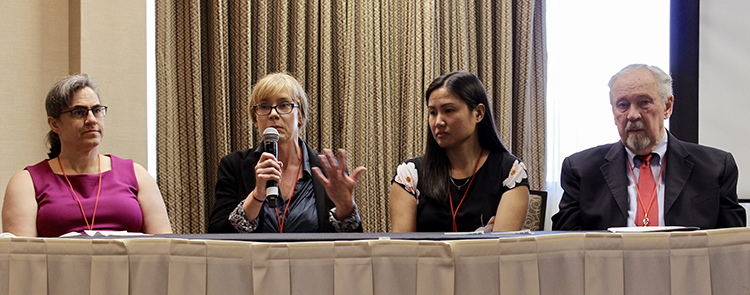
Dr. Clarissa Kripke, Suzanne Bennett Francisco, Ann Hien Bui, and Dohn Hoyle, experts on supported decision-making, speak at Disability Voices United’s conference in November 2019


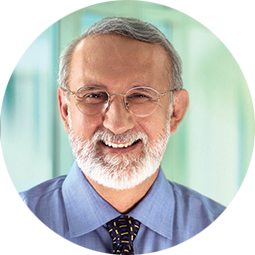 Sergio Aguilar-Gaxiola, MD, PhD
Sergio Aguilar-Gaxiola, MD, PhD